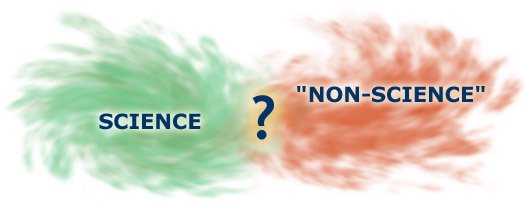Difference between science and non-science
The simplest answer is the following.
Any subject taught in schools with the same content, with the same books in Moscow, Washington, Beijing, Tehran and Bengal is science.


On the contrary, any subject whose content, books and approach are different in Moscow, different in Pyongyang, different in Beijing, different in New York is not science but what Nassim Taleb called "construction".
Science is universal. Mathematics is universal. While sociology, economics, management and philosophy are political constructions dependent on the interest of local power structures.
No country with sufficient intellectual resistance teaches other political constructs to its pupils and students.
Did you know that sociology was invented by Western countries to counter Communism? They also teach this stuff in colonial universities !!
The sad part is that some people waste 4 years or more of their life studying political propaganda tools?
Why not think about studying science???
@profgabs05 2021
Science is "catholic"?
Catholic means universal. Catholicism rose from within a scholarly movement dedicated to the pursuit of universal truths.
It is strange to see the claim that science is the one universal truth?
I suspect that it is fun to be the arbiter of truth.
Mathematics and science has fundamental problems with completeness. Scholars have known about intractable paradoxes since antiquity. Mathematicians continue to have problems with the reflexive paradox and absolutes.
For centuries mathematicians felt that Euclidean Geometry was a universal truth.
For the most part science is a collection of constructs. Newtonian physics is a construct that works well for things on the human level. It falls apart when one tries to apply it on really big or really small things.
Newtonian physics references strange ideas like entropy and gravity without giving an adequate explanation of these constructs.
It seems to me that the thing that made science successful was that most scientists avoid claims to universal truth while contenting themselves with a pursuit of those constructs which most accurately describe reality.
People who start with claims to universal truths end up stumbling on their individual hubris. Those who accept that they are dealing with fallible man-made constructs tend to actively engage whatever subject they pursue in a more rigorous manner.
Hmmm...
A wonderful point you have here.
And i kind of seem to get it.
But i don't get the part where you said these universal truths don't give adequate explanation of their constructs.
Newton never explained what gravity or entropy was. He simply gave us a system of equations that helped us calculate these forces. I am not sure if anyone has come up with a satisfactory explanation of gravity or entropy.
Entropy might an artifact of an expanding universe.
There isn't an adequate explanation for the constructs of gravity or entropy. Scientists work comfortably with the equations without full knowledge of the true nature of these things.
As for the point I was making: I suspect that a major reason that science has been so successful is that scientists have concentrated on creating equations that other scientists can verify.
There have been scientists and mathematicians who've convinced themselves that their understanding of math or science is a universal truth. These people are rarely the source of great scientific discoveries. Great discoveries generally come from people who are actively engaged in questioning their ideas.
You have hit on one of the strange paradoxes of the mind. People who start with the believe that they know the truth are more likely to end up in error than people who actively engage in questioning their own ideas.
BTW: The reason science books are the same around the world is because the ideas of science evolved in a fairly well networked university system.
I suspect that, if we met an alien race, our scientists would have a hard time understanding the alien science. Would aliens write their equations with a squiggly line for integration sigmas for summations?
Would three-toed aliens write everything in base ten?
The scientists would have to take the constructs used by the aliens and translate the ideas into the constructs used by human science.
Why is the subject for programming called "computer science"? Why is it a "science"? Science should involve experiment and conclusions based on experiments. There is a little bit of this in unit-testing and bench marking but it is more like construction or engineering than science.
The end goal in science is not to create or build something. I think the term "software engineering" is more apt. I think the term "construction" sounds good to me.
Its actually true, everything else asides science are just systems men came up with to organize society and navigate the world. That doesn't mean studying it is a waste of time, it has it's own importance, organizing society as best we could is a really important matter.